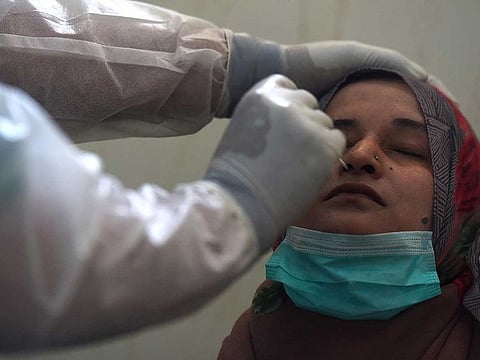COVID-19: Pakistan health officials warn against unregulated use of plasma as demand surges
Risk of life-threatening transfusion reactions, say medical experts

Islamabad: Convalescent plasma has turned into a high-value commodity in Pakistan as desperate families are turning to social media in search of plasma donors for their loved ones – those severely ill with COVID-19. Hundreds of requests are popping up online every day while some of those who have recovered from the coronavirus are demanding as high as Rs120,000 for one bag of plasma.
Reach out to authorized hospitals only, don’t pay for plasma
Reacting to the pandemic profiteering and the new trend of illegal sale and purchase of plasma, health officials have said plasma therapy should not be considered as a cure for coronavirus. “CP is still an experimental therapy, and it can only be safely used under controlled settings as part of the research protocol,” read a statement from the Ministry of National Health Services (NHS) which also warned about possible side effects.
Only approved hospitals are allowed clinical trials under supervision after obtaining approval and getting the health facility authorized by NHS. “Convalescent Plasma (CP) use is one of the interventions currently under investigation in Pakistan” as well as worldwide. However it cannot be considered “a standard therapy” as there are insufficient data to either recommend or disprove the use of COVID-19 plasma for now, according to the official guidelines.
Guidelines for public by NHS for plasma use:
- Individuals who have fully recovered from COVID-19, are asymptomatic for at least two weeks and are willing to donate plasma can contact helpline 1166.
- Get in touch with the designated hospital for information regarding the trial in progress
- Do not pay money to buy plasma from different blood banks/hospitals.
- Stay updated on official information
Where can recovered people donate plasma?
Pakistan has allowed a clinical trial on plasma therapy. Recovered patients can donate plasma at the following centers: 1. Pakistan Institute of Medical Sciences 2. Rawalpindi Medical University 3. Hayatabad Medical Complex 4. Khwaja Safdar Medical College Hospital 5. University of Health Sciences 6. Pakistan Kidney Liver Institute 7. Regional Blood Centre 8. National Institute of Blood Disease 9. People’s University of Medical and Health Sciences
“Unregulated use of blood plasma can be harmful”
President of Pakistan Society of Haematology, Dr Parvez Ahmed, has cautioned against the unregulated use of plasma which “without optimal donor screening and patient selection can be harmful.” It can sometimes lead to “life-threatening transfusion reactions and transmission of infections” which is why it should only be used at clinical trials by designated centers. Contrary to the media hype, currently “there is no scientific proof for benefit of plasma in COVID-19 patients” says the official statement. The organization requested Pakistan health officials and regulatory bodies to immediately “stop illegal and potentially harmful plasma trade and regulate in judicial use.”
However, top hematologist and head of NIBD, Dr Tahir Shamsi, says the passive immunization clinical trial using CP for COVID patients have been approved by both local and foreign bodies. “The goal of our clinical trial is to prevent patients from needing ventilators,” he said. Plasma therapy is an experimental treatment that has yielded mixed results, as trials were still ongoing. There have been some positive results and also some disappointment in cases where patients were not provided proper care, he told local media.
How plasma therapy works?
The treatment involves injecting antibody-rich plasma from recovered Covid-19 patients into those who are still infected. Antibodies, also known as immunoglobulins, are proteins in blood that fight specific bacteria and viruses. The donor antibodies temporarily help a sick person fight infection effectively.
Pakistan’s Drug Regulatory Authority of Pakistan (DRAP) has approved plasma treatment for patients in mid-April while hospitals began therapy trials in early May.
Sign up for the Daily Briefing
Get the latest news and updates straight to your inbox









